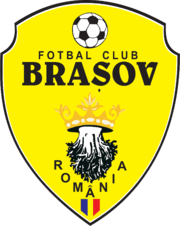
FC Brașov
Fotbal Club Brașov is a professional football club based in the city of Brașov, Romania. They were founded in 1936, and since then they have spent 41 seasons in the top-flight. Brașov kits are yellow-black, and they play their home matches on the Silviu Ploeșteanu stadium.
History
Early modern football in Brașov
"Prehistoric" football in Brașov started between 1912 and 1914. In 1927, the unrelated Colțea Brașov won a major title. In the second edition of Division C (1937–1938), the team Brașovia had given way to the new team "Astra" Brașov, founded a year earlier in 1936, which developed through the years to the current team from the foot of the mountain Tâmpa, FC Brașov. Players from this precursor of FC's in '37 may be considered the first generation in the team history. Ten of them are mentioned by the press: Năftănăilă (no relation to Lulu Năftănăilă from the later history of the club), Aurel Stroe, Pitu, Chicomban (a known family of multiathletes), Danciu, Pedra, Chirică, Dumitrescu, A. Iftimie, Dănăilă, Dragan.

Brașov
Brașov (Romanian pronunciation: [braˈʃov]; also known by other alternative names) is a city in Romania and the administrative centre of Brașov County.
According to the last Romanian census, from 2011, there were 253,200 people living within the city of Brașov, making it the 7th most populous city in Romania, and the metropolitan area is home to 369,896 residents.
Brașov is located in the central part of the country, about 166 kilometres (103 miles) north of Bucharest and 380 km (236 mi) from the Black Sea. It is surrounded by the Southern Carpathians and is part of the Transylvania region.
The city is notable for being the birthplace of the national anthem of Romania and for hosting the Golden Stag International Music Festival.
Etymology
The city was described in 1235 AD under the name Corona, a Latin word meaning "crown", a name given by the German colonists. According to Binder, the current Romanian and the Hungarian name Brassó (Hungarian pronunciation: [ˈbrɒʃːoː]) are derived from the Turkic word barasu, meaning "white water" with a Slavic suffix -ov. Other linguists proposed various etymologies including an Old Slavic anthroponym Brasa.
Podcasts:

